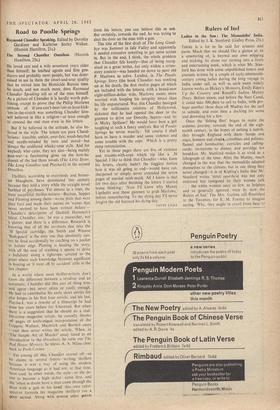Road to Poodle Springs
Raymond Chandler Speaking. Edited by Dorcithy Gardiner and Kathrine Sorley Walker. (Hamish Hamilton, 21s.) He loved cats and a wife seventeen years older than himself; he loathed agents and film pro- ducers and probably most people, but was deter- mined to see in them the sweet-and-sour quality that he mixed into his Homicide Bureau men. So much, and not much more, does Raymond Chandler Speaking tell us of the man himself. As a picture of Chandler it is hardly worth pub- lishing, except to prove that the Philip Marlowe attitude of if-you-can't-beat-'em-at-least-kick- 'em-in-the-crutch was something Chandler him- self believed in like a religion—at least enough to conceal the real man even in his letters.
But if he believed in the attitude, he also be- lieved in the style. The letters are pure Chand- leriana: irascible, unfair, over-fair, mush-hearted and needle-minded by turn and mood—but always the undiluted whisky-sour style. And for anybody who cares, they are also—being mainly .post-war—a fascinating gloss on the how-he- dunnit of the last three novels (The Little Sister, The Long Goodbye and Playback) in the second Omnibus.
Thrillers, according to everybody and Somer- set Maugham, have dominated this century because they told a story while the straight novel burbled of psychoses. Yet almost to a man, the most succeCsful thriller-writers—Buchan, Sapper and Fleming among them—wrote plots that were Pure fuzz and made their names on 'scenes that never seemed to have been written before'— Chandler's description of Dashiell Hammett's talent. Chandler, too:. he was a researcher, not a plotter, and there is a difference. Research is knowing that of all the revolvers that take the .38 Special cartridge, the Smith and .Wesson `Bodyguard' is the only one that absolutely can- not be fired accidentally by catching on a pocket or holster edge. Plotting is hauling the story. with all the ease of teaching a spastic to drive a bulldozer along a tightrope, around to the Point where such knowledge becomes significant in busting an 'it went off by accident' alibi in the last chapter.
In a world where most thriller-writers don't know the difference between a revolver and an automatic, Chandler did this sort of thing time and again—but never often or easily enough. He had to cannibalise his early short stories for plot hinges in his first four novels, and his last, Playback, was a rewrite of a filmscript he had done ten years before for Universal. But when there is a suggestion that he should do a real- life-crime magazine article, he casually throws nit pages of knife-edged interpretation of the Crippen, Wallace, Maybrick .and Bartlett cases --and then never writes the article. When, in 'The Simple Art of Murder' essay (used as an introduction to the Omnibus), he sorts out The Red House Mystery. he blows A. A. Milne clear back to Pooh Corner.
Yet among all this, Chandler started off—so he claims in several letters- writing thrillers because it was a way of using the modern American language as it had not, at that time, been used. In other words, the style—or the de- sire to become a high stylist--came first, and the 'when in doubt have a man come through the door with a gun in his hand' (his• own retro- spective formula for magazine thrillers) ran a Poor second. Along with several other points from his letters, you can believe this or not. But certainly, towards the end, he was trying to shut the door on the man with a gun.
The title of the first draft of The Long Good- bye was Summer in Idle Valley and apparently it needed extensive rewriting to get some action in. But in the end, I think, the whole problem that Chandler felt keenly—that of being recog- nised as a great writer, but only within a crime- story context—was handed on down to poor old P. Marlowe to solve. Landed, in The Poodle Springs Story (the book Chandler was working on at his death, the first twelve pages of which are included with the letters), with a brand-new eight-million-dollar wife,. Marlowe seems more worried with keeping his integrity intact than his life unpunctured. Was this Chandler besieged by the millionaire mistress of Hollywood, sickened that he had opened the door to the gunmen to drive out Dorothy Sayers—and let in Micky Spillane? He would have bust a gut laughing at such a fancy analysis. But of Poodle Springs he wrote wearily: 'Of course I shall have to have a murder and some violence and some trouble with the cops.' Which is a pretty steep renunciation.
Yet in those pages there are five of violence and trouble-with-cops which zip like a .38 Special. I like to think that Chandler—who, from his letters, clearly hadn't the foggiest notion how it was all going to end—would have cut, sharpened or simply never extended the seven pages of marital mish-mush. All I know is that for two days after finishing the letters I started home thinking: Wow I'll know why Manny Lipshultz sent those gunmen to grab Marlowe,' before remembering. To my dying day I'll never forgive the old buzzard his dying day.
GAVIN LYALL


































 Previous page
Previous page